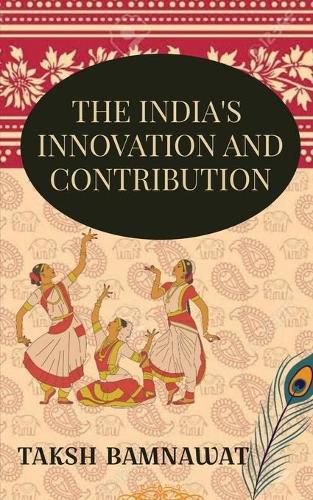Readings Newsletter
Become a Readings Member to make your shopping experience even easier.
Sign in or sign up for free!
You’re not far away from qualifying for FREE standard shipping within Australia
You’ve qualified for FREE standard shipping within Australia
The cart is loading…






This title is printed to order. This book may have been self-published. If so, we cannot guarantee the quality of the content. In the main most books will have gone through the editing process however some may not. We therefore suggest that you be aware of this before ordering this book. If in doubt check either the author or publisher’s details as we are unable to accept any returns unless they are faulty. Please contact us if you have any questions.
India is a vast land brimming with talented and creative people of diverse backgrounds. There are many wonderful things India has introduced to the world. From 0 to the world’s first university, from Snakes & Ladders to shampoo, India has been quite the Santa Claus.
India made an important contribution to science. In ancient times, religion and science were inextricably linked.
Astronomy made great strides in India because the planets began to be regarded as gods, and their movements began to be closely observed.
Their study became essential because of their connection to changes in the seasons and weather conditions which were important for agricultural activities. The science of grammar and linguistics arose because the ancient brahmanas stressed that every Vedic prayer and mantra should be recited with meticulous precision.
In fact, the first result of the scientific outlook of Indians was the development of Sanskrit grammar. In the fifth century BC, Panini systematized the rules governing Sanskrit and produced a grammar called Ashtadhyayi. By the third century BC, mathematics, astronomy, and medicine began to develop separately. In the field of mathematics, the ancient Indians made three distinct contributions: the notation system, the decimal system, and the use of zero. The earliest epigraphic evidence for the use of the decimal system is in the beginning of the fifth century AD.
$9.00 standard shipping within Australia
FREE standard shipping within Australia for orders over $100.00
Express & International shipping calculated at checkout
This title is printed to order. This book may have been self-published. If so, we cannot guarantee the quality of the content. In the main most books will have gone through the editing process however some may not. We therefore suggest that you be aware of this before ordering this book. If in doubt check either the author or publisher’s details as we are unable to accept any returns unless they are faulty. Please contact us if you have any questions.
India is a vast land brimming with talented and creative people of diverse backgrounds. There are many wonderful things India has introduced to the world. From 0 to the world’s first university, from Snakes & Ladders to shampoo, India has been quite the Santa Claus.
India made an important contribution to science. In ancient times, religion and science were inextricably linked.
Astronomy made great strides in India because the planets began to be regarded as gods, and their movements began to be closely observed.
Their study became essential because of their connection to changes in the seasons and weather conditions which were important for agricultural activities. The science of grammar and linguistics arose because the ancient brahmanas stressed that every Vedic prayer and mantra should be recited with meticulous precision.
In fact, the first result of the scientific outlook of Indians was the development of Sanskrit grammar. In the fifth century BC, Panini systematized the rules governing Sanskrit and produced a grammar called Ashtadhyayi. By the third century BC, mathematics, astronomy, and medicine began to develop separately. In the field of mathematics, the ancient Indians made three distinct contributions: the notation system, the decimal system, and the use of zero. The earliest epigraphic evidence for the use of the decimal system is in the beginning of the fifth century AD.